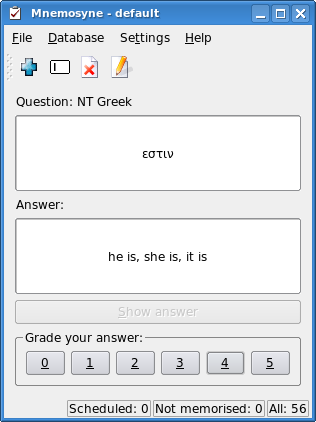This post was originally posted on Babelhut.
Εν αρχη (en archae) means “in the beginning.”
After 7 months without studying at all, I’ve finally sat down and spent some time a couple nights ago to study New Testament Greek (also called Koine Greek). I’m primarily following the lessons in a book called “Learn New Testament Greek” by John H. Dobson. I started on the third lesson as the first was all about the Greek alphabet, which I still remember, and the second lesson was mostly simple words that I also still remember.
Though the book does not instruct me to do so, I wrote down every Greek word in the lesson and it’s English meaning as I proceeded. I also wrote down many of the small phrases that were in the lesson, like “όιτος ό λογος (hoitos ho logos – this word).” It took me much longer to study this way, but I think the effect will be worth it.
Earlier tonight I installed Mnemosyne, an open-source flash card program which uses spaced repetition to help you study more efficiently. Mnemosyne is written in Python and runs on Linux, Windows, and Max OS X. Mnemosyne works by displaying the flash cards that you don’t know well more often than cards that you do know well. This method of study is more efficient than just studying words in a list day after day. Mnemosyne’s website has a good page describing this process without getting too technical.

Once I had Mnemosyne installed, I entered all the words and phrases I had written down two nights ago into the application. I was then able to test myself with the cards, slightly dismayed at how many I could not recall, even though I had written the words down previously and just now typed them into the computer. Clearly, I have my work cut out for me. I expect that Mnemosyne will be of great value to my study. I plan to write a more in-depth review of Mnemosyne later, after I have a better feel for its effectiveness.
Stay tuned next time for my discussion of starting with Spanish!